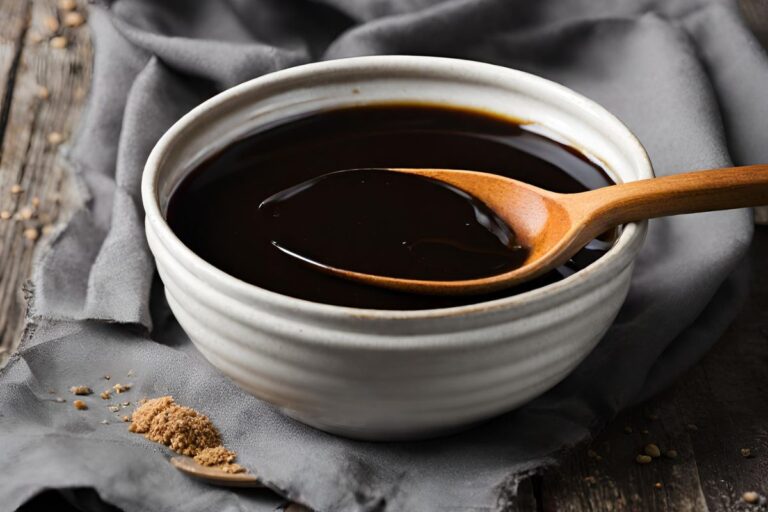In an era where the shelf life of food products is a hot topic, molasses stands out as a fascinating case study. This rich, dark syrup, a byproduct of sugar production, is often relegated to the back of the cupboard, emerging only for specific recipes.
But does molasses go bad? It’s a question that might seem straightforward, but the answer is layered, much like the flavors of molasses itself.
Important Points
- Learn about storing molasses and how long it lasts.
- No, molasses does not need to be refrigerated.
- Store molasses in a cool, dark place like a pantry.
- Molasses can last for a long time if stored properly.
Does molasses go bad?
Contrary to popular belief, and despite its sugar-dense composition, molasses is not immune to spoilage. However, in terms of longevity, it’s more similar to honey than, the quick expiration on milk. Molasses can last for years without going bad, but this doesn’t mean it’s eternal.
The primary enemies of molasses are moisture and air exposure, which can introduce molds and fermentation over an extended period.
How to store molasses
Whether molasses should be refrigerated is often debated. From my experience and research, refrigeration isn’t necessary and can even be detrimental, leading to increased viscosity and making it harder to pour. Instead, molasses thrives in a cool, dark, and dry environment. The key is ensuring the container is airtight to prevent moisture and air from spoiling the syrup.
According to usda.gov
Unopened molasses can be stored at room temperature for 12 months. After opening, store at room temperature for 6 months for best quality.
💡 Insider Tip: Transfer molasses to a glass jar with a tight-sealing lid for optimal storage. Plastic containers can deteriorate over time and may not provide an adequate seal.
How long does molasses last?
Molasses’ shelf life can feel like a mystery, but when stored properly, it can last well beyond its best by date. Unopened, molasses can be good for up to 10 years, though this is a conservative estimate.
Once opened, if stored correctly, it can last for at least 5 years without significant degradation in quality. But, as with all things, it’s not immune to change over time. The flavor may mellow, and the color could darken further, but these are not signs of spoilage.
The longevity of molasses in my pantry has been a testament to its durability. I’ve used molasses well beyond the 5-year mark with no adverse effects, though I’m meticulous about storage conditions. However, relying solely on time can be misleading; knowing how to spot spoilage is crucial.
How to tell if molasses is bad
Molasses turning bad is a rare event, but not impossible. Signs of spoilage include mold growth, an off odor, or a sour taste. Any visible changes in texture or the appearance of fermentation bubbles are clear indicators that the molasses should not be used.
💡 Insider Tip: Regularly inspect stored molasses, especially if it’s been in your pantry for an extended period. A quick smell and visual check can prevent a culinary mishap.
Real-life Experience: Making the Most of Expired Molasses
I remember when I found an old jar of molasses in the back of my pantry that had expired a few months prior. Instead of throwing it away, I decided to experiment with it in my baking. I found that the flavor had become richer and more intense, adding a delicious depth that I hadn’t experienced before.
Despite being past its expiration date, the molasses was still safe to consume and brought an extra dimension to my recipe. This experience taught me that even if molasses is past its prime, it can still be used to enhance the flavor of various dishes.
What to do with molasses
Molasses is a versatile ingredient, adding depth and complexity to a wide range of dishes. From baking gingerbread cookies to crafting a rich barbecue sauce, its applications are vast. But beyond culinary uses, molasses can serve in home remedies and gardening, acting as a natural sweetener or soil additive.
In my kitchen, molasses is a staple, not just for its flavor but for its nutritional benefits, including iron, calcium, and magnesium. I’ve experimented with it in both savory and sweet recipes, finding that its flavor profile enhances nearly any dish it touches.
💡 Insider Tip: For an unconventional use, mix molasses with warm water and use it as a plant fertilizer for robust growth.
Frequently Asked Questions
What happens if molasses is refrigerated?
It may become thicker, but it won’t spoil.
How should molasses be stored?
It’s best stored in a cool, dry place.
Why not refrigerate molasses?
Refrigeration can make it harder to pour.
How long can molasses last unrefrigerated?
Unopened, it can last indefinitely if stored well.
Further Reading
Should Mustard Be Refrigerated?
Should Soy Sauce Be Refrigerated?
Should Honey Be Refrigerated?
Does Fish Sauce Need to Be Refrigerated?
Should Worcestershire Sauce Be Refrigerated?
Does Molasses Need to Be Refrigerated
Better Living uses affiliate links. If you make a purchase through them, we may receive a small commission (for which we are deeply grateful) at no cost to you.



